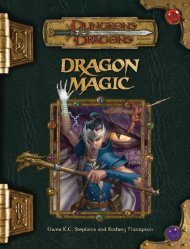D&D 3.5 - Complete Mage [OEF]
Create successful ePaper yourself
Turn your PDF publications into a flip-book with our unique Google optimized e-Paper software.
CHAPTER 1<br />
FUNDAMENTALS<br />
12<br />
be chosen, although illusionists sometimes like to combine<br />
real objects and creatures with projected ones for maximum<br />
confusion.<br />
NECROMANCY<br />
Necromancy spells hold dominion<br />
over life and death. Their effects can<br />
drain the stamina out of an opponent's<br />
body, exert control over the undead, or<br />
instill paralyzing fear in a creature's<br />
mind.<br />
Specialists in this school call themselves<br />
necromancers, and they subscribe<br />
to the philosophy of waste not, want<br />
not. Detractors of the school condemn<br />
necromancers' practices as<br />
abhorrent and disrespectful to the<br />
dead, but necromancers defend<br />
their art on the premise that<br />
the dead care very little for their<br />
bodies, especially if they can be<br />
put to good use. Controlling such<br />
bodies, however, is secondary to<br />
controlling life.<br />
To a necromancer, magic is<br />
based on the idea that life is<br />
an essential element in the<br />
universe—one that can be<br />
controlled and manipulated<br />
just as matter and energy can<br />
be. Necromancers believe that<br />
they hold the reins of life by<br />
surrounding themselves with<br />
undead creatures. People who<br />
challenge the necessity of this<br />
school claim that necromancy<br />
weakens the barriers between<br />
the dead and living realms, causing<br />
the two to encroach upon one<br />
another more each day.<br />
Philosophically, necromancy is opposed to the school<br />
of enchantment, which claims supremacy over the mind.<br />
Necromancy trumps the mind by claiming dominion<br />
over life. Necromancy also finds little in common with<br />
conjuration; while conjurers must create their own power<br />
by summoning and the like, necromancers work with<br />
whatever is on hand at the time.<br />
Personality: Necromancers are introspective characters<br />
with a pragmatic approach to death. As a necromancer, you<br />
might exhibit any or all of the following personality traits.<br />
You are heedless and insensitive toward the emotions of<br />
people about death.<br />
You are hopeful and impatient as people die, seeing their<br />
bodies as useful material for your spells.<br />
You are obsessed with your own mortality and crave<br />
immunity from death.<br />
You brood instead of discussing or sharing your<br />
thoughts.<br />
Prohibited Schools: As a necromancer, you are inclined<br />
to make illusion one of your prohibited schools, valuing<br />
permanent spell effects over mental tricks that can be disbelieved<br />
away. Conjuration largely serves a redundant purpose<br />
to necromancers, who call upon legions of undead to serve<br />
their needs rather than summoned monsters. Enchantment is<br />
also a good choice for a prohibited school, since necromancers<br />
rarely have any need for living servants.<br />
TRANSMUTATION<br />
A transmutation spell modifies energy and matter.<br />
The effect could alter a creature's shape,<br />
boost mental or physical qualities, or<br />
change the way something interacts<br />
with the world.<br />
Specialists in this school call themselves<br />
transmuters, and they subscribe<br />
to the philosophy that if life gives<br />
you an orange, make lemonade.<br />
Adversaries of the transmutation<br />
school claim that only gods have the<br />
right to change creation, but transmuters<br />
feel that if something can be<br />
retasked to serve a more meaningful<br />
purpose, the amount of change<br />
is irrelevant. They claim that any<br />
hurdle, no matter how daunting,<br />
can be solved by changing it into<br />
something harmless.<br />
Transmuters attribute the<br />
strength and variety of their spells<br />
to a belief that all things in the<br />
universe must inevitably change<br />
into something else. They merely<br />
accelerate that ongoing evolutionary<br />
momentum to suit their needs.<br />
Those who deride this theory as<br />
romantic nonsense claim instead<br />
Undead are at the beck and call of a<br />
that transmutation places an unnecessary<br />
powerful necromancer<br />
strain on the universe, because as objects<br />
are continually modified, new and unpredictable aberrations<br />
begin to take form of their own accord.<br />
Philosophically, transmutation is opposed to the school of<br />
conjuration. Rather than working with existing materials,<br />
conjuration creates or summons new materials. Evocation<br />
is similar in this regard, in that both schools create effects<br />
instead of modifying what is on hand. Necromancy and<br />
transmutation are complementary schools, since both share<br />
the same view of using whatever is available. Whether alive,<br />
dead, or inanimate, the raw materials can be altered to become<br />
something more.<br />
Personality: Transmuters are tinkerers at heart, never<br />
content to leave things as they are. As a transmuter, you might<br />
exhibit any or all of the following personality traits.<br />
You are a troubleshooter who enjoys overcoming challenging<br />
obstacles.<br />
You are a natural actor who assumes the role of any creature<br />
whose forms you take.


![D&D 3.5 - Complete Mage [OEF]](https://img.yumpu.com/55502633/12/500x640/dampd-35-complete-mage-oef.jpg)

